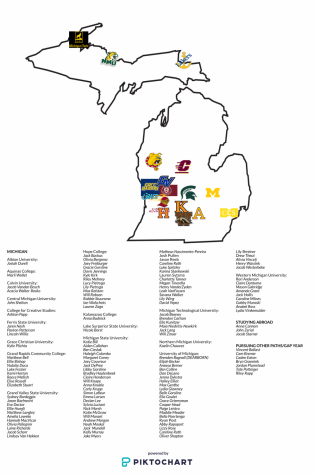Editorial: All or nothing politics
March 11, 2020
Throughout the course of the past few years, the political climate has been the most polarized it’s ever been. Whether it be the recent impeachment of President Trump or the 2016 elections, the two political parties are becoming more and more extreme. This has affected all levels of government, as seen with the recent mayoral election that made statewide news due to the polarization. This extreme rhetoric has pushed many moderate people to align themselves with a party that they don’t agree with.
This started following the 2008 election of Barack Obama. His election was historic, but it was met with extreme pushback. In 2010 the Republican House made a No-Compromise pledge, with the sole purpose of stopping President Obama’s actions. This was the beginning of the end of our political system. Since then the two parties have only had one goal, that being to stop the actions of the other party. This was on full display at the recent State of the Union address. President Trump’s address took the second stage to the antics of both parties; there were chants, jeers, and ripped up speeches. To be frank, it was embarrassing to watch and it shows how low the two parties have stooped.
As the leaders of the party get more extreme, so do the followers. We as a country have seen formerly great movements devolve into radical beliefs. It isn’t hard to find these movements either, because they are the ones that have captivated the american public in recent years. If you look at the feminist movement, the #MeToo movement, #AllLivesMatter, or religious groups you can see this extreme rhetoric in some of the members. The worst part is that these extreme members are the people that the general public associates with the movement. Whether it be pro-life believers being disowned by the democratic party, or gay people being denied communion in the Catholic church, our country is continually growing more and more polarized.
Bret Stephens, a New York Times columnist, summed it up in an article regarding the #MeToo movement by saying “Social movements rarely succeed if they violate our gut sense of decency and moral proportion.” As the country becomes more divided politically, When we see a local priest refusing communion to a parish member who has spent a majority of her life attending that church and has given thousands of dollars to it, it violates our gut sense of decency. This in turn pushes more and more people away from that movement, even if it is something like religion that has played a significant role in our world’s history.
The worst part of it all though is the disappointment that the country feels when they see a movement go through this. The feminist movement has been something in our country for hundreds of years, and it has changed our country in an extremely positive way. According to a YouGov.com survey of 1.2 million people in 2018, there is a significant group of the country that have distanced themselves from the movement. Only 38% of women identify as feminist and 22% of men do. 48% of non-feminist women don’t identify as feminists because they believe the movement is too extreme, and another 47% don’t identify because they don’t believe the current wave of feminism represents true feminism. Despite this 82% of people believe that women and men should be considered equal, which is the fundamental belief behind the feminist movement.
This discrepancy is what I’m trying to highlight in all of the movements. The moderate American no longer fits in to our political society. This isn’t because there aren’t any moderate people left, it’s because they’re being forced to choose between two extremes. Look at the presidential election coming up, the two frontrunners as of now are the opposite of moderate. There’s Bernie Sanders, a self appointed socialist, and President Trump who seems to like making the democratic party mad more than he does actually leading our country. This is causing them to choose to either vote for someone they don’t support, or not vote at all. Neither of these options are beneficial for the democracy, but they’re the only choices we as voters have.








